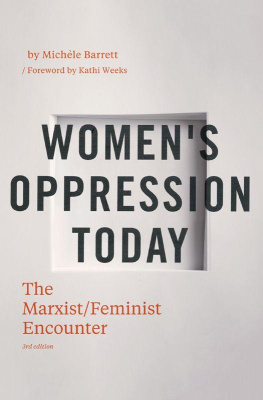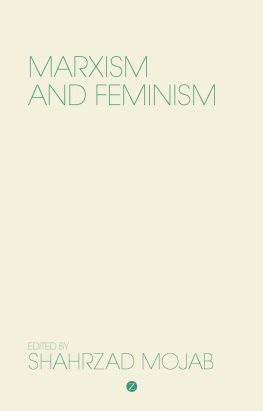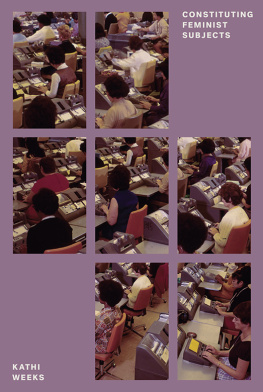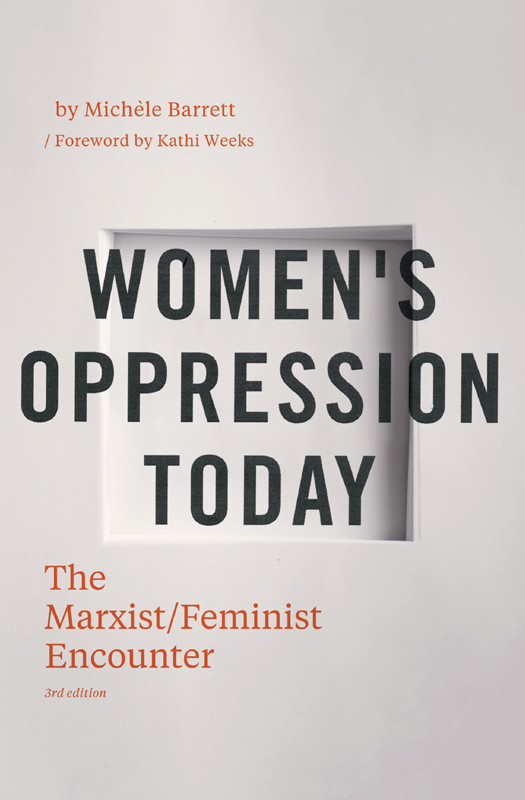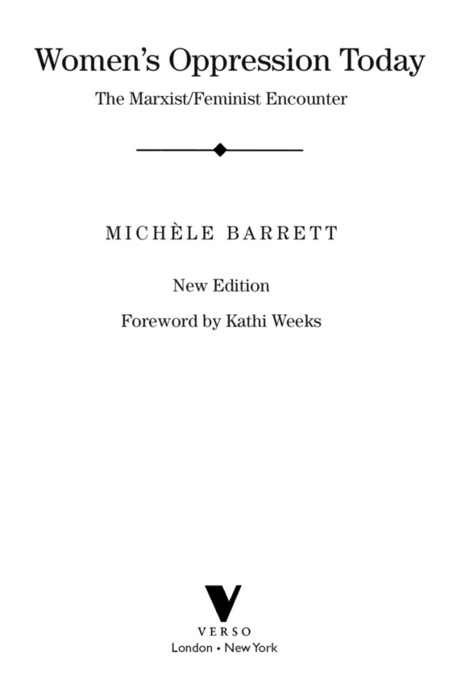This edition published by Verso 2014
First published by Verso 1980
Michle Barrett 1980, 1988, 2014
Foreword Kathi Weeks 2014
All rights reserved
The moral rights of the authors have been asserted
Verso
UK: 6 Meard Street, London W1F 0EG
US: 20 Jay Street, Suite 1010, Brooklyn, NY 11201
www.versobooks.com
Verso is the imprint of New Left Books
ISBN-13: 978-1-78168-013-1 (PBK)
ISBN-13: 978-1-78168-014-8 (HBK)
eISBN-13: 978-1-78168-223-4 (US)
eISBN-13: 978-1-78168-532-7 (UK)
British Library Cataloguing in Publication Data
A catalogue record for this book is available from the British Library
Library of Congress Cataloging-in-Publication Data
A catalog record for this book is available from the Library of Congress
v3.1
For Mary McIntosh (19362013)
Contents
Foreword: Re-encountering Marxist Feminism
Kathi Weeks
This is a remarkably opportune time for the reissue of Michle Barretts classic work of 1970s feminist theory. Originally published in 1980, Womens Oppression Today represents one of the best examples of the project of Anglo-American Marxist feminist scholarship that peaked in that period. For the last few decades, however, the 1970s has been remembered by feminists as the time when we made mistakes, as a perhaps necessary, but by many accounts, distressingly nave point on the road to our more enlightened and sophisticated present. In this respect, feminist theory would seem to have a rather exceptional relationship to its historical traditions. It is as if the clocks in the world of feminist theory run at a faster rate than those in other theoretical domains. Some theorists today treat Marx, or even Machiavelli, as if he were our contemporary, taking for granted that his work has some bearing on the present. In feminist theory, by contrast, the 1970s has been more typically treated whether this is celebrated or mourned as if it were the distant past, over and done. Recently, however, there has been a resurgence of interest in the period. Many scholars now seem more willing to revisit the feminist 1970s in general, and what Barrett names in her revised subtitle The Marxist/Feminist Encounter in particular, in ways that are better able to acknowledge both their insights and their blind spots, their wealth of possibilities for informing new feminist work together with the inevitable limits of their relevance.
To be sure, each of these familiar narratives provides valuable critical purchase on aspects of this particular artefact of the 1970s, helping us to discern some of its achievements and failures, strides and missteps. The loss narrative usefully highlights the value of Barretts contribution to the project of feminist political economy that flourished at that time and later fell out of favour; the progress narrative effectively exposes the relative lack of attention in the analysis to the impacts of race, ethnicity and citizenship as intersecting axes of inequality.
While I recognize the value of these specific critical interventions, the conception of the relations between the feminist past, present and future that inform the two historical frameworks are limited by their tendencies toward a relentless linearity. With their teleologies of progress or loss that presume to foretell the pasts future, and their schematic reduction of a diversity of work to a serviceable plotline in a grander narrative, these models risk foreclosing the potential of the untimely or unexpected that could emerge from our rereadings. I am interested in temporalities that encourage us to actively engage the past rather than merely sit in judgment on it, whereby the effects of the encounter are less a matter of remembering than remaking. Rather than archives of claims to accept or reject, these historical artefacts might be more usefully approached on other affective and cognitive registers as disruptions and challenges, irritants and enticements, intensifications and inspirations. Instead of a static and continuist ordering of time, wherein history is fixed and contained, the past could be rendered more on the model of the future, as less stable and determinant, something that emerges out of every present differently in relation both to the changing horizon of a potential future and to the forces and events that shape its terms of possibility. My hope is that we can continue to develop alternative orientations to the feminist archive that can enable a more open set of possibilities for what our different encounters with it might produce, for what we might find troubling or generative in our return to the 1970s in this moment.
If, as I have suggested, we are now at a point when the standard critiques of 1970s feminism can be approached as orthodoxies of their own in need of unsettling, the reissue of Barretts text presents an excellent opportunity since, by my reading at least, it more often confounds than conforms to the conventional readings of texts guided by the historiographical accounts rehearsed above. There are four closely related aspects of the text that I find at once especially compelling and easily misconstrued. These are not exactly what I would describe as the prescient, anticipatory, or untimely elements of the argument gems of insight that require hindsight to appreciate. Rather, what attracts me most are what could be seen as some of the more dated dimensions of the text, or at least features of the analysis that might be judged harshly by the dominant narratives. In an attempt to follow Barretts example in her ability to work across so many different levels of abstraction, from the philosophical to the historical and empirical, I will try to present these points in a descending order of abstraction from the more general contours to the more specific elements of her contribution to the Marxist feminist theoretical project. For the sake of simplicity, these discussions will be organized around four of the categories under which important debates among Marxist feminists were organized: theory, totality, materialism and reproduction. Released from their consignment to the historical dustbin, with some of their nuance and complexity restored, each of the categories, as Barrett approaches them, has much to offer the contemporary reader.
PRACTISING THEORY: ANALYSIS AND ACTIVISM
One of the reasons why Womens Oppression Today is such an instructive example for thinking about the relationship between the multiple archives of the feminist past and its variable presents is that, in keeping with the Marxist feminist ethos of the time, it is crafted as both a political intervention and a theoretical construction. By one reading, the text could be mistakenly taken as representative of feminisms so-called better days, when theory was properly subservient to practice. And it is true, Barretts interest in concrete political problems and in questions of tactics and strategy are clear; analysis and activism are tightly interwoven in ways not uncommon for the period. But contrary to this story about the political virtues of the Marxist feminist past, Barrett is equally committed to the project of what some describe disparagingly as high theory. Thus, in the original preface, she cautions readers about the reflective style, analytical focus, and studied calm they will encounter.and womens oppression that she articulates over the course of the book. The relationship between what we might delimit as theory and as practice in feminist studies is sometimes more immediate, sometimes more estranged; in some cases it is more intentional and in others less conscious. But it is worth attending to the possibility that any activist text can produce theoretical insights and that any given theoretical text can generate practical implications. In this regard, neither Marxist feminism in general nor


